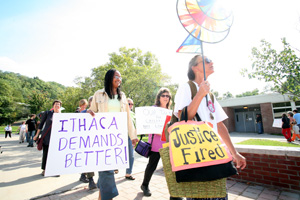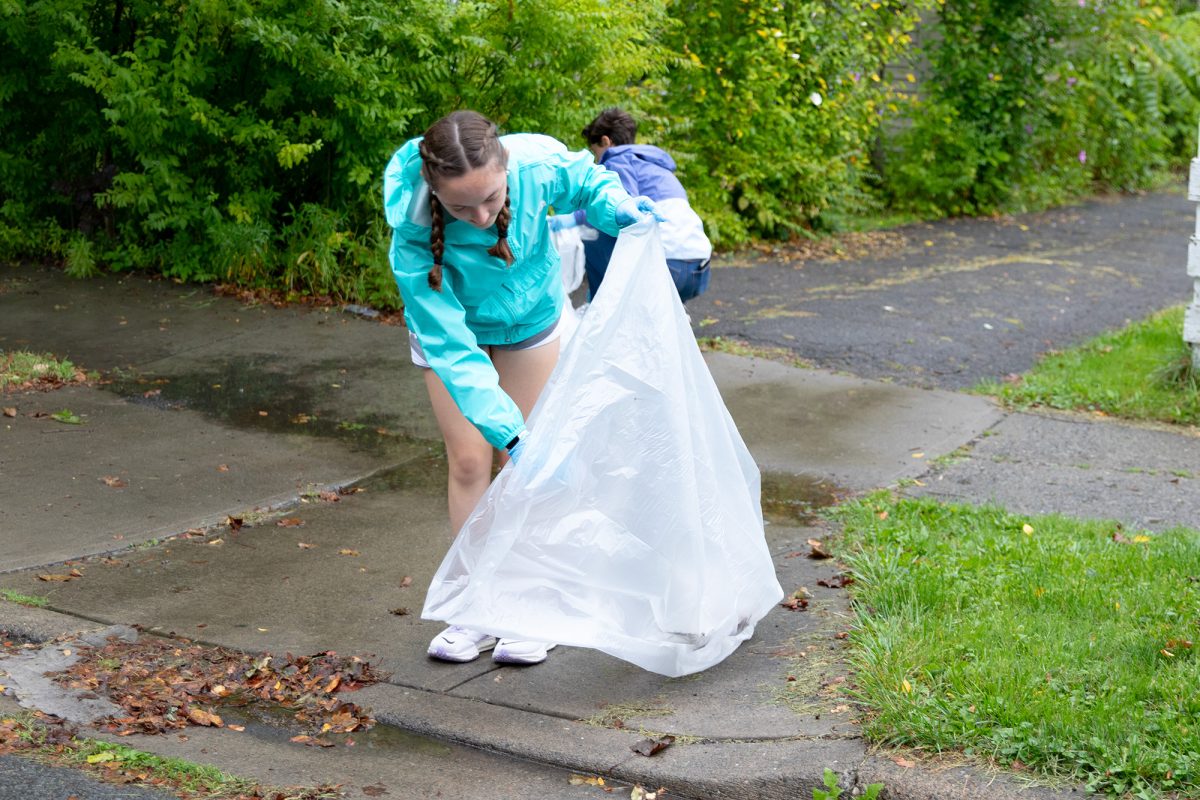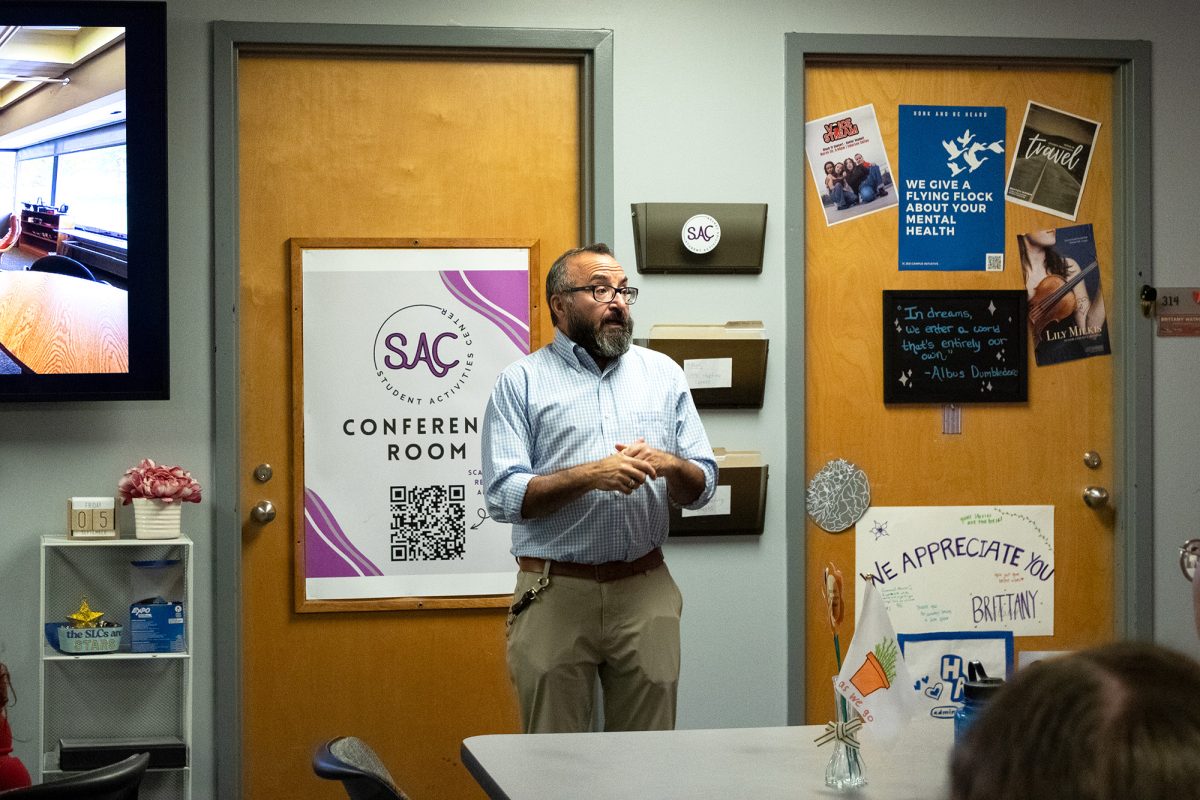More than 80 protesters, angry at the way the Ithaca City School District has handled a case of alleged racial harassment against a student, marched into the offices of the superintendent Monday and demanded answers.

The rally began at noon with a march and several speakers outside the district offices. After about an hour, protesters moved indoors and occupied the office of Superintendent Judith Pastel, chanting, “Come out, Judy.”
In recent weeks, the case, Amelia Kearney vs. Ithaca City School District, has shaken Ithaca, a community often hailed as progressive, as local activist groups like the Race Liberation Alliance and Cornell University’s Black Students United have joined the cause, and the local arm of the New York State Human Rights Division has taken on the case.
Kearney said within a five-month period, her 14-year-old daughter, Epiphany, was repeatedly spit at on the school bus, hit and threatened with violence and racial epithets during the 2005–06 academic year at DeWitt Middle School. Kearney, 37, is an Ithaca College student majoring in criminal and juvenile justice. Her daughter is now a student at Ithaca High School.
Kearney alleges that under
human rights law, the district did not do enough to protect her child and did not allow her to receive an education. She’s seeking compensation for emotional damage and wants the district to admit that it did not do all it could to protect her daughter.
“The [district] has admitted that yes, [incidents] did occur,” Kearney said. “The question is, were they timely and effective [in responding]. I want [Epiphany] to be compensated for her mental anguish. She’s been traumatized by this.”
The rally-goers were angry at the district because it had recently challenged the division’s jurisdiction over the case and forced an injunction to postpone the case until the issue can be decided.
“I think it’s a travesty of injustice, that in itself is a crime,” said Joyce Muchan, vice chairwoman of Tompkins County Human Rights Commission. “For Epiphany to not have her day in court is an injustice.”
Pastel said the commission should not have jurisdiction because it would force the district to break federal student privacy laws by showing video of other students to defend itself.
If the district prevails, the legal precedent it sets would mean all public school children in New York state would not have protection in education under human rights law, Muchan said. She said with this precedent it would be harder for parents to seek claims against school districts in discrimination cases. They would be forced to hire a lawyer or attempt to join a class-action suit.
At Monday’s rally, high school and college students and community members flooded into Pastel’s office to set up an appointment to speak with her, but were told by her assistant, Doreen Bowles, that she was unavailable.
Inside the office, Ithaca High School senior Thandi Farley spoke to protesters about the “hostile learning environment” she and other minority students like Epiphany encounter on a daily basis at IHS.
“Last year, one of my friends was bumped in the hallway, [and] they said they were going to lynch her, they called her a nigger,” she said. “This stuff happens all the time at our school, and nobody recognizes it.”
The Ithaca Police Department was called to the scene around 1 p.m. and stood by to make sure the rally stayed civil. No arrests were made.
Pastel announced around 2 p.m. that she would speak with protesters, who had agreed to leave the offices as long as Pastel would meet with them. When she arrived outside, she told the crowd that she was there to listen.
Several high school students addressed the superintendent, demanding, they said, to know why white students received lesser punishments for incidents in which both white and black students were equally guilty.
After about 10 minutes of questions, Pastel said, “Thank you all very much,” and retreated inside to shouts of “No, come back,” and then, “Pastel must go.” The Ithaca Police Department locked the doors behind her.
Bailey Johnson, an Ithaca College sophomore present at the rally, said he thought the superintendent should step down because of her poor handling of the situation.
“First [Pastel] should get rid of this injunction and the whole legal process and let [Epiphany] have her day in court,” he said. “Everybody needs to hear these issues. Basically, they’re trying to sweep this under the rug.”
Alan Gomez, assistant professor of Latino studies who also attended the rally to show his support for Kearney, said racism is deeply ingrained in American culture and its schools.
“I think it’s sad how young children can be influenced by their parents and their environment,” he said. “I don’t think that 11-year-old has the capacity to understand what it means to say, ‘we’re going to hang you up by the tree.’”
The college’s African-Latino Society has joined Cornell’s Black Students United to protest the district’s actions as well. Senior Tyrell Lashley, spokesperson for ALS, said the group will attend next Tuesday’s school board meeting to express its support for Kearney’s daughter.
“We do not understand the school district’s reasoning behind why they feel students’ rights should not be protected under human rights laws,” he said.
At a conference at the Human Rights Commission last Friday, Lashley spoke for ALS asking Ithaca College President Peggy R. Williams to support Kearney and the Human Rights Commission.
Williams responded with a letter to ALS, which was read at the group’s meeting Tuesday. Williams said she supported ALS in standing up for issues they believe in but that she didn’t think it was appropriate for the college to become involved.
The district’s request for an injunction to postpone the case is due on Friday. The five-judge panel could make their decision as early as Friday, though it will most likely take longer.
No date is currently set for when the district’s appeal will be heard.







